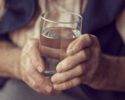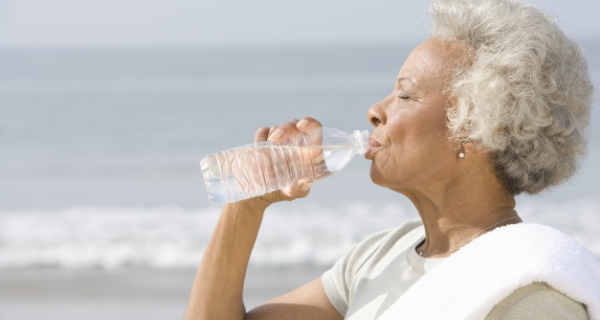Older people are at an increased risk for dehydration, which is why it’s so important to seek out ways to stay hydrated. Dehydration occurs when an individual loses more fluid than is taken in. Left untreated, dehydration can be serious and negatively impact bodily functions.
It’s especially important for seniors to pay attention to their hydration levels because they can be at greater risk for dehydration due to common health conditions, as well as certain medications. Staying hydrated, however, is a matter of taking a few practical steps to create healthy hydration habits, which may help prevent more serious medical complications.
Dehydration and Seniors
There are many factors that determine how much of our bodies are made up of water, such as gender, weight, and percentage of body fat. As we age, our bodies tend to hold less water. That’s why older individuals are prone to developing dehydration.
As we age, we also lose the ability to detect thirst, so we may not know we need to drink something until the early signs of dehydration start. Some seniors may have the added challenge of getting water for themselves due to limited mobility. Others may try to reduce their liquid intake in an attempt to prevent frequent trips to the bathroom or urinary incontinence.
All of these factors increase the danger of dehydration, so it is important to monitor your daily water intake and recognize the signs that you may need to start drinking more.
Signs and Symptoms of Dehydration
According to the Cleveland Clinic, the longer you’re dehydrated, the more your symptoms will worsen. But for older adults, symptoms of dehydration can sometimes be hard to distinguish from general ailments or other medical issues.
Mild dehydration can cause:
- Dry mouth or skin
- Fatigue
- Dizziness
- Muscle cramps
If your loved one is exhibiting signs of mild dehydration, get them to drink a full glass of water first and then reassess the situation.
Severe dehydration is more serious ― symptoms to look for include:
- Difficulty walking
- Confusion
- Rapid heart rate
- Fainting
If you believe your loved one might be suffering from severe dehydration, contact their doctor as soon as possible.
Hydration Tips for Seniors
Older adults should drink plenty of water each day, increasing daily intake gradually if necessary. Research shows that people often mistake hunger for thirst and vice versa, so don’t wait until you feel thirsty to start drinking more liquids.

Below are a few other tips to help seniors stay hydrated:
- Encourage frequent drinking in moderate amounts by keeping water easily accessible at all times. Choose a mug, cup, or reusable water bottle that your loved one likes and have them keep it on hand.
 Drinking doesn’t need to be limited to water - milk, broth, juice, and frozen fruit pops can all add to your loved one’s liquid intake. Just be sure to look at sodium and sugar levels and stick to options that work with your loved one’s dietary needs.
Drinking doesn’t need to be limited to water - milk, broth, juice, and frozen fruit pops can all add to your loved one’s liquid intake. Just be sure to look at sodium and sugar levels and stick to options that work with your loved one’s dietary needs.  Many foods you eat, especially fruits and vegetables, contain water. Eating foods like cucumbers, tomatoes, and watermelon can help keep you hydrated.
Many foods you eat, especially fruits and vegetables, contain water. Eating foods like cucumbers, tomatoes, and watermelon can help keep you hydrated.- Avoiding alcohol and minimizing your sodium and caffeine intake can also help keep you hydrated.
A research study conducted by a team of investigators at UCLA showed that participants who were hydrated performed better than those who were dehydrated on a walking and balance test.
So, drink up!
More Health and Wellness Tips
Staying hydrated is just one piece of the wellness puzzle. Explore more articles like these, such as how to get started with a healthy exercise routine, and nutrition tips for adults over 70.



